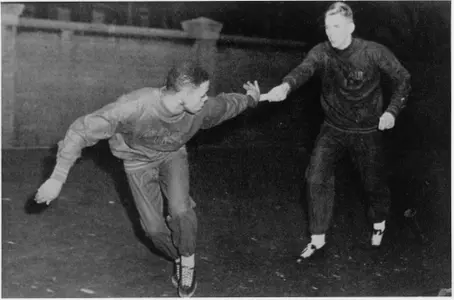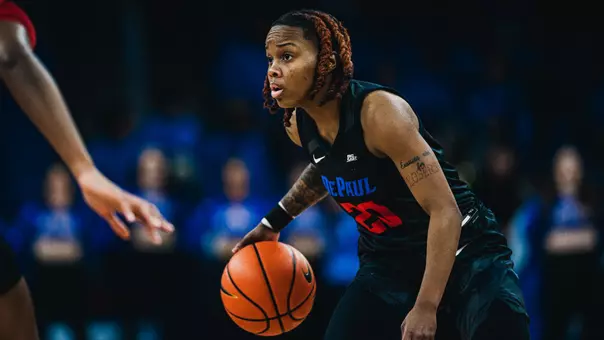DePaul University Athletics

Blackman Embodies Seminal Moment in DePaul History
12/14/2018 11:53:00 AM | MEN'S TRACK
DePaul remembers groundbreaking track and field legend Nate Blackman
CHICAGO – Rare was the moment in his 88 years when Nate Blackman wasn't consumed with evolving into a better version of himself to better impact the world around him.
From his early years growing up in the in Ida B. Wells housing project through his stellar formative years as an outstanding student and athlete at St. Elizabeth High School, accelerating that exemplary path at DePaul, serving in the military and emerging as one of the most enterprising and innovative educators in Chicago Public Schools history, Blackman never compromised on his standards of excellence.
The world he fought so relentlessly to improve---especially with his passion for educating young people---lost a tremendous benefactor when the Blue Demon track and field standout passed away last month.
It was the fall of 1947 when Blackman and four African-American teammates integrated DePaul's track and field team---a few months after Jackie Robinson broke the color barrier in Major League Baseball.
Steadfast in his faith, innate leadership skills, intelligence and charm, Blackman excelled as a top performer in the 200 and 400-meter relays along with the 400, finishing with one of the best racing resumes in Blue Demon history.
That bygone era existed in a totally different environment from contemporary America as former track teammate and friend Harry Brown recalls.
"I grew up in Des Plaines and didn't know any African-American people until I came to DePaul," Brown said. "It was so beneficial to get to know Nate. He was a very good student. His senior year Nate was chosen the D-Club Athlete of the Year---the first time a non-basketball player had won that award.
"It was so different back then. One time when we were in Des Moines for the Drake Relays, our coach had to go somewhere so he put us in a cab to the track facility. We drove through a black area and the cab driver started saying all these derogatory things about the people living there.
"Nate did not react, even though it was bothering him. He maintained his temper. The rest of us were so naïve at the time. But looking back now after all the years since college---getting married, working and raising our children---this is what comes back to me."
Blackman was a sophomore when Brown joined the team as a freshman and they became good friends. As a difference-making finisher, Blackman anchored the 4x100 relay team and Brown ran the first leg.
Blackman was DePaul's first modern track and field star with the program's rejuvenation in the spring of 1948. He single-handedly upgraded the program's travel schedule, perpetuated by his prolific 400-meter running.
"Our relay team was among the first from DePaul to compete at the prestigious Drake Relays," Brown said. "Not only that, but I have medals that we won there, so we must have done pretty well."
Brown remembers taking school administration classes with Blackman at DePaul's graduate school and how they would run at meets at the University of Chicago. Brown is 88 years old living in Wauconda and still runs almost every day. He has competed in masters track meets in Finland, Italy, Japan, Australia and South Africa.
"Nate and his wife and my wife and I would always connect at alumni events, and I remember a dance we all attended on a lakefront boat about 10 years after DePaul," Brown said. "Afterwards, we went out to eat at this restaurant in the Edgewater Beach Hotel.
"When we walked into the place, we were stopped and told they didn't have any seats. Again, Nate didn't say anything and kept his composure as we left to go someplace else. Looking back years later, I began to realize all the prejudice Nate had to endure for much of his life."
Always a humble man, this Bronzeville native talked about the importance of being grounded, believing in himself and always being dignified while competing and leading athletes who might have been different from him.
He was a proud DePaul "Triple Demon" earning a Bachelor of Arts in Education, a Masters in Administration and Supervision and a Specialist Degree in Administration and Supervision. Blackman was always willing to speak to Blue Demon student-athletes about his experiences. He was inducted into DePaul's Athletic Hall of Fame in 1978 and is memorialized with a photographic mural at the Ray Meyer Fitness & Recreation Center.
"The first time I met Nate was at Hanson Stadium when I was an assistant coach on DePaul's team," said Blue Demon track and field head coach Dave Dopek. "Nate had reached out to us asking about working out with the team as part of his masters training.
"It was nice to interact with someone who had been around the track program for a number of years. I enjoyed listening to Nate's stories about when he was competing at DePaul and how great he felt to be back at practice.
"He was always such a humble man. But in a lot of ways, he was the guy who started the whole process that has led us to a BIG EAST Outdoor Track title."
In their own ways, both Blackman and Dopek are iconic figures in the history of DePaul track and field. Dopek became the school's first national champion when he captured the 200-meter title at the 1995 NCAA Indoor Championship in Indianapolis. He accomplished that feat while running the hallways of Alumni Hall for his training.
"Nate and all the guys of his era were doing this before all the bells and whistles," Dopek said. "They were running on bricks. That trumps me running in the hallways."
Dopek embraced every opportunity to engage Blackman.
"I was always personally excited to see him at the alumni events," Dopek said. "It was almost like being reunited with a member of my own family. He'd come over and greet me warmly with: 'My man!'
"Talking to him about how things were in his day provided so much perspective for me as a coach. I remember the first event I saw him after I had become head coach. He walked over to me and said: 'Congratulations. Now we can get the sprints going again.'
"I think he was excited that a guy who had won a national title in the 200 was heading up the Blue Demon track and field program. The 200 was also one of his better events."
In the middle of conversation, Dopek began searching around his office for a valuable relic of DePaul track history. He had transferred it from the program's trophy case for safekeeping and placed it someplace special in his office.
Only now, he couldn't remember where he put it. Finally, a look of relief swept across his face as he located a DePaul yearbook from 1951. On the inside cover was the inscription: N. Blackman.
Following his days at DePaul and in the military, Blackman became an innovative and progressive reformer concerned about urban youth. He taught at Doolittle Elementary School, became an assistant principal and then the Assistant to the Area and District Superintendents.
He was promoted to principal at Walter Reed Elementary School, and in 1970 became the first principal of Chicago's Metropolitan Studies High School (Metro)---the nation's first "School Without Walls."
Metro was a radical experiment in alternative education---right up Blackman's wheelhouse. The city of Chicago was the metaphorical classroom as businesses, cultural institutions and neighborhoods opened their doors and became Metro.
Blackman was singled out for praise from the accrediting committee of the North Central Association of Colleges in 1973. The report stated: "Within the school, the principal is making an invaluable and irreplaceable contribution."
His insightful leadership attracted global interest about Metro. England's BBC-TV network ran a feature story on the revolutionary school. The late Pulitzer Prize-winning columnist Mike Royko wrote about the
school's unusual approach to education and the late Walter Cronkite featured the story on his national TV news broadcast.
"The impact and influence Nate had on the athletics department with his athletic and academic accomplishments laid the groundwork for the future success of the men's and women's track programs," said DePaul Athletics Director Jean Lenti Ponsetto.
"When you look back on history and pick out the seminal moments, what Nate accomplished rises to the top of the list. What he took away from DePaul educationally allowed him to become incredibly innovative and thoughtful about how young people learn.
"Nate was a masterful advocate, teacher and motivator of young people. It comes as no surprise the measure of success he had and the thousands of students he impacted as an educator in the Chicago Public Schools system."
Blackman's legacy has left behind a huge imprint on the Blue Demon athletics scene.
"He was groundbreaking at DePaul, and the way he operated at such a high level in the CPS to get the most out of students and faculty is a real credit to his innovation, creativity and ability to lead," Ponsetto said. "His leadership skills were at a very high level whether relating to his teammates at DePaul or the elementary school students he helped to educate. He was very direct, honest and genuine about what it will take to be successful.
"I remember talking to him about our first Field Trip Day, and he was really excited for the opportunity to have elementary school students on a college campus for an eye-opening experience and introducing them to the possibility of a college education."
The news of Blackman's passing brought back a flood of memories for Brown.
"I still remember the impact he had on all of us on the track team," Brown said. "We all had so much confidence in him as our captain. Nate was a great finisher in relays, and he was one of my best friends at DePaul. I was so sorry to hear about him passing away.
"In a lot of ways, he was a big influence on my life."
From his early years growing up in the in Ida B. Wells housing project through his stellar formative years as an outstanding student and athlete at St. Elizabeth High School, accelerating that exemplary path at DePaul, serving in the military and emerging as one of the most enterprising and innovative educators in Chicago Public Schools history, Blackman never compromised on his standards of excellence.
The world he fought so relentlessly to improve---especially with his passion for educating young people---lost a tremendous benefactor when the Blue Demon track and field standout passed away last month.
It was the fall of 1947 when Blackman and four African-American teammates integrated DePaul's track and field team---a few months after Jackie Robinson broke the color barrier in Major League Baseball.
Steadfast in his faith, innate leadership skills, intelligence and charm, Blackman excelled as a top performer in the 200 and 400-meter relays along with the 400, finishing with one of the best racing resumes in Blue Demon history.
That bygone era existed in a totally different environment from contemporary America as former track teammate and friend Harry Brown recalls.
"I grew up in Des Plaines and didn't know any African-American people until I came to DePaul," Brown said. "It was so beneficial to get to know Nate. He was a very good student. His senior year Nate was chosen the D-Club Athlete of the Year---the first time a non-basketball player had won that award.
"It was so different back then. One time when we were in Des Moines for the Drake Relays, our coach had to go somewhere so he put us in a cab to the track facility. We drove through a black area and the cab driver started saying all these derogatory things about the people living there.
"Nate did not react, even though it was bothering him. He maintained his temper. The rest of us were so naïve at the time. But looking back now after all the years since college---getting married, working and raising our children---this is what comes back to me."
Blackman was a sophomore when Brown joined the team as a freshman and they became good friends. As a difference-making finisher, Blackman anchored the 4x100 relay team and Brown ran the first leg.
Blackman was DePaul's first modern track and field star with the program's rejuvenation in the spring of 1948. He single-handedly upgraded the program's travel schedule, perpetuated by his prolific 400-meter running.
"Our relay team was among the first from DePaul to compete at the prestigious Drake Relays," Brown said. "Not only that, but I have medals that we won there, so we must have done pretty well."
Brown remembers taking school administration classes with Blackman at DePaul's graduate school and how they would run at meets at the University of Chicago. Brown is 88 years old living in Wauconda and still runs almost every day. He has competed in masters track meets in Finland, Italy, Japan, Australia and South Africa.
"Nate and his wife and my wife and I would always connect at alumni events, and I remember a dance we all attended on a lakefront boat about 10 years after DePaul," Brown said. "Afterwards, we went out to eat at this restaurant in the Edgewater Beach Hotel.
"When we walked into the place, we were stopped and told they didn't have any seats. Again, Nate didn't say anything and kept his composure as we left to go someplace else. Looking back years later, I began to realize all the prejudice Nate had to endure for much of his life."
Always a humble man, this Bronzeville native talked about the importance of being grounded, believing in himself and always being dignified while competing and leading athletes who might have been different from him.
He was a proud DePaul "Triple Demon" earning a Bachelor of Arts in Education, a Masters in Administration and Supervision and a Specialist Degree in Administration and Supervision. Blackman was always willing to speak to Blue Demon student-athletes about his experiences. He was inducted into DePaul's Athletic Hall of Fame in 1978 and is memorialized with a photographic mural at the Ray Meyer Fitness & Recreation Center.
"The first time I met Nate was at Hanson Stadium when I was an assistant coach on DePaul's team," said Blue Demon track and field head coach Dave Dopek. "Nate had reached out to us asking about working out with the team as part of his masters training.
"It was nice to interact with someone who had been around the track program for a number of years. I enjoyed listening to Nate's stories about when he was competing at DePaul and how great he felt to be back at practice.
"He was always such a humble man. But in a lot of ways, he was the guy who started the whole process that has led us to a BIG EAST Outdoor Track title."
In their own ways, both Blackman and Dopek are iconic figures in the history of DePaul track and field. Dopek became the school's first national champion when he captured the 200-meter title at the 1995 NCAA Indoor Championship in Indianapolis. He accomplished that feat while running the hallways of Alumni Hall for his training.
"Nate and all the guys of his era were doing this before all the bells and whistles," Dopek said. "They were running on bricks. That trumps me running in the hallways."
Dopek embraced every opportunity to engage Blackman.
"I was always personally excited to see him at the alumni events," Dopek said. "It was almost like being reunited with a member of my own family. He'd come over and greet me warmly with: 'My man!'
"Talking to him about how things were in his day provided so much perspective for me as a coach. I remember the first event I saw him after I had become head coach. He walked over to me and said: 'Congratulations. Now we can get the sprints going again.'
"I think he was excited that a guy who had won a national title in the 200 was heading up the Blue Demon track and field program. The 200 was also one of his better events."
In the middle of conversation, Dopek began searching around his office for a valuable relic of DePaul track history. He had transferred it from the program's trophy case for safekeeping and placed it someplace special in his office.
Only now, he couldn't remember where he put it. Finally, a look of relief swept across his face as he located a DePaul yearbook from 1951. On the inside cover was the inscription: N. Blackman.
Following his days at DePaul and in the military, Blackman became an innovative and progressive reformer concerned about urban youth. He taught at Doolittle Elementary School, became an assistant principal and then the Assistant to the Area and District Superintendents.
He was promoted to principal at Walter Reed Elementary School, and in 1970 became the first principal of Chicago's Metropolitan Studies High School (Metro)---the nation's first "School Without Walls."
Metro was a radical experiment in alternative education---right up Blackman's wheelhouse. The city of Chicago was the metaphorical classroom as businesses, cultural institutions and neighborhoods opened their doors and became Metro.
Blackman was singled out for praise from the accrediting committee of the North Central Association of Colleges in 1973. The report stated: "Within the school, the principal is making an invaluable and irreplaceable contribution."
His insightful leadership attracted global interest about Metro. England's BBC-TV network ran a feature story on the revolutionary school. The late Pulitzer Prize-winning columnist Mike Royko wrote about the
school's unusual approach to education and the late Walter Cronkite featured the story on his national TV news broadcast.
"The impact and influence Nate had on the athletics department with his athletic and academic accomplishments laid the groundwork for the future success of the men's and women's track programs," said DePaul Athletics Director Jean Lenti Ponsetto.
"When you look back on history and pick out the seminal moments, what Nate accomplished rises to the top of the list. What he took away from DePaul educationally allowed him to become incredibly innovative and thoughtful about how young people learn.
"Nate was a masterful advocate, teacher and motivator of young people. It comes as no surprise the measure of success he had and the thousands of students he impacted as an educator in the Chicago Public Schools system."
Blackman's legacy has left behind a huge imprint on the Blue Demon athletics scene.
"He was groundbreaking at DePaul, and the way he operated at such a high level in the CPS to get the most out of students and faculty is a real credit to his innovation, creativity and ability to lead," Ponsetto said. "His leadership skills were at a very high level whether relating to his teammates at DePaul or the elementary school students he helped to educate. He was very direct, honest and genuine about what it will take to be successful.
"I remember talking to him about our first Field Trip Day, and he was really excited for the opportunity to have elementary school students on a college campus for an eye-opening experience and introducing them to the possibility of a college education."
The news of Blackman's passing brought back a flood of memories for Brown.
"I still remember the impact he had on all of us on the track team," Brown said. "We all had so much confidence in him as our captain. Nate was a great finisher in relays, and he was one of my best friends at DePaul. I was so sorry to hear about him passing away.
"In a lot of ways, he was a big influence on my life."
Episode 33: Finding Calm: Jaiden Gary’s Throwing Journey
Tuesday, January 20
The Extra Meter: Caroline Muller
Friday, February 08
The Extra Meter: Jade Gates
Thursday, May 03
HIGHLIGHTS: 2018 DePaul Invitational
Sunday, April 22





